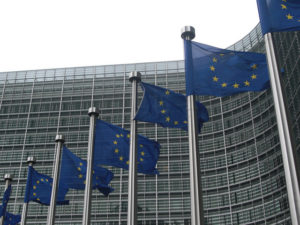Under the shadow of the recent high profile drone incursions at U.K. airports, the European Commission presented its draft technical rules – otherwise known as the Delegated Act – to the European Parliament’s Transport Committee. The discussion was heated, with some members of parliament unhappy with the draft rules.
The text of the Delegated Act can be downloaded here , but the Act proposes a risk-based framework whereby an “open” category of low risk operations is subject to fewer restrictions and “specific” and “certified” categories of operations have clear regulations and application procedures.
The Act has been years in the making and has the support of the worldwide and European drone industry, who hope more clarity and reasonable regulations will open further commercial applications. Through provisions for registration, remote ID and a clear regulatory framework the Act will also make damaging incidents like the recent airport incursions far less likely.
While in yesterday’s meeting some members of the European Parliament appear to be unwilling to move the Act forward any delay, says the Drone Manufacturers Alliance Europe (DMAE), means increased risk of more incidents.
“We want to emphasise the need to get on with it, rather than finding reasons to stall, otherwise safety will be compromised,” says DMAE spokesperson Paula Iwaniuk.
The Drone Manufacturers Alliance Europe Press Statement:
Drone manufacturers: Prompt adoption of EU drone rules will boost safety of drone operations
30 January 2019 – Drone Manufacturers Alliance Europe (DMAE), the organisation representing the majority of civilian drone manufacturers, welcome the European Commission’s presentation of its draft Delegated Act on unmanned aircraft intended for use in the ‘open category,’ and on third-country operators of unmanned aircraft systems to the Members of the European Parliament’s Transport and Tourism (TRAN) Committee.
Creating harmonised, but balanced frameworks where safety is a central pillar is no easy feat; yet the European Commission has achieved just that through its Delegated Act after numerous consultations with industry experts, Member States as well as Members of the European Parliament.
“Industry, operators, society – can no longer wait for EU drone rules. After the alleged incidents at Gatwick, Heathrow and Newark, it’s a wake-up call to all regulators. The new rules will go a long way in identifying airborne drones, keeping unauthorised operations away from airports, and implementing measures to educate operators and users” said Paula Iwaniuk of DMAE.
Specifically, DMAE recognises the positive developments on remote electronic identification and geofencing. Such technological innovation will help separate good operators from rogue operators, as well as provide information about zones where operators can and cannot fly.
Iwaniuk said: “We started talking about EU drone rules in December 2015. Let’s make 2019 the year where we can collectively achieve this. Let’s give operators, manufacturers and the broader industry, law enforcement and the public the right tools. Let’s not compromise on safety. Yesterday’s hearing was important, and I’m encouraged by the willingness of all sides to resolve any outstanding questions.”
She added: “We appreciate that more work needs to be done to cover the heavier and higher risk drone segments. But any delay now – especially if based on merely formalistic concerns – would only prolong the current regulatory vacuum in the consumer drone segment and that’s not acceptable.”
About DMAE
Drone Manufacturers Alliance Europe (DMAE) accounts for almost 80% of the civilian drones operated in the world today. Together, Delair, DJI, GoPro, Parrot and Sensefly (Parrot Group), bring unrivalled experience in the innovation, design, production, operation and regulation of civilian drones. Our drones are operated for private, commercial and public uses. Committed to safety and security, DMAE cooperates with regulators and decision-makers at national, European and international levels in order to contribute to the policy debate and share our expertise.

Miriam McNabb is the Editor-in-Chief of DRONELIFE and CEO of JobForDrones, a professional drone services marketplace, and a fascinated observer of the emerging drone industry and the regulatory environment for drones. Miriam has penned over 3,000 articles focused on the commercial drone space and is an international speaker and recognized figure in the industry. Miriam has a degree from the University of Chicago and over 20 years of experience in high tech sales and marketing for new technologies.
For drone industry consulting or writing, Email Miriam.
TWITTER:@spaldingbarker
Subscribe to DroneLife here.








[…] center of drone regulations. European regulators have made significant progress in creating a framework that will apply across member states, and are at the cutting edge of urban drone regulations. In a presentation […]